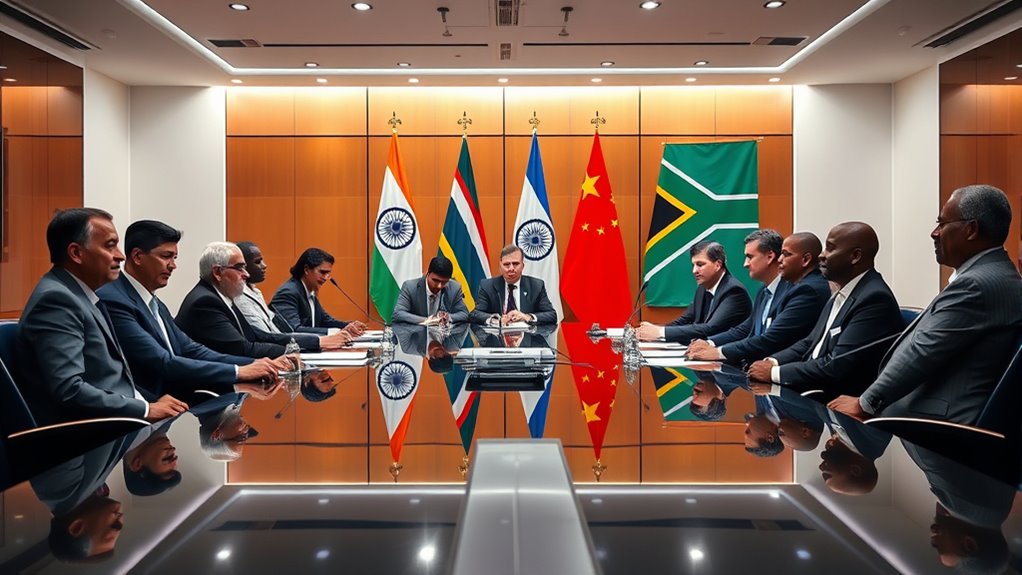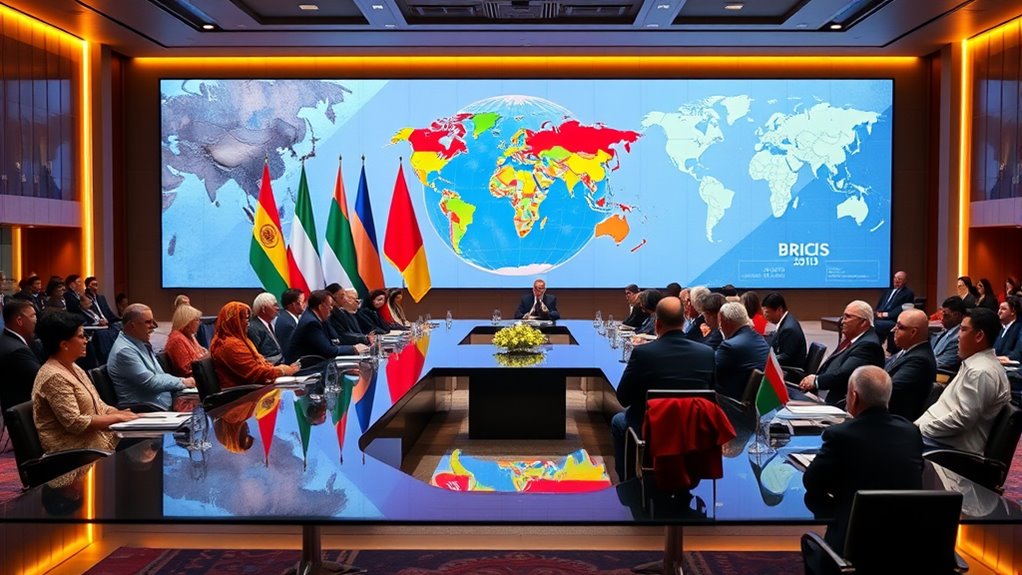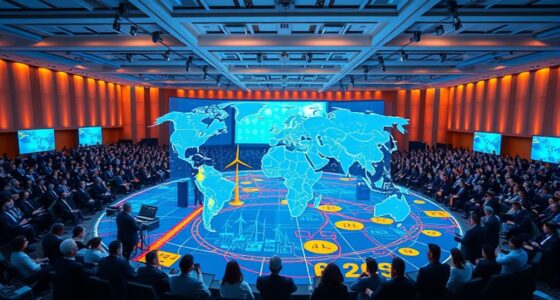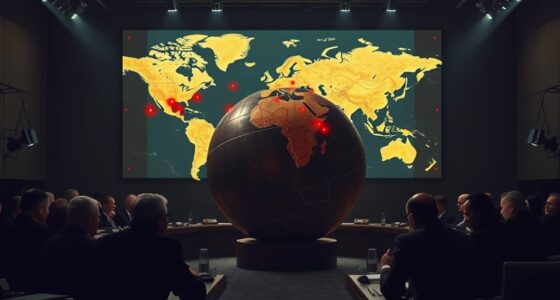Expanding BRICS signals a shift toward a more multipolar world, where emerging economies challenge Western dominance and reshape global power structures. As new members join, their diverse strengths boost collective economic influence and bargaining power on the international stage. This drives reforms in global institutions, advocating for more equitable representation. Diplomatic strategies become more assertive, leading to new alliances and complex negotiations. If you want to understand how this expansion will influence global relations, there’s more to explore.
Key Takeaways
- BRICS expansion fosters a multipolar world, diminishing Western dominance and dispersing global economic influence.
- New member countries enhance collective economic strength, boosting influence in global trade and financial institutions.
- The bloc adopts assertive diplomatic strategies, advocating for reforms in global governance and power structures.
- Expanded BRICS seeks to reform international institutions for more equitable representation and influence of emerging economies.
- Increased membership heightens diplomatic competition, reshaping international negotiations and creating a more dynamic geopolitical landscape.

Have you wondered how the recent expansion of BRICS will reshape global power structures? This move signifies more than just a broader membership; it signals a shift in the geopolitical landscape that could redefine economic influence worldwide. As more countries join this alliance, you’ll see a realignment of economic power centers, challenging the dominance traditionally held by Western nations. These new members bring their unique strengths, resources, and markets, which collectively amplify BRICS’s economic influence on the global stage. This expansion means greater bargaining power in international trade, investment, and financial institutions, allowing member countries to push for reforms that better reflect their interests. You’ll notice a more multipolar world taking shape, where economic influence isn’t concentrated in a handful of Western capitals but dispersed among emerging economies.
Diplomatic strategies are also evolving alongside this expansion. As BRICS broadens its reach, member nations are increasingly adopting more assertive diplomatic tactics to promote their collective interests. This includes forging new alliances, engaging in strategic partnerships, and utilizing multilateral platforms to amplify their voice. You’ll see them push for reforms in global institutions like the IMF and World Bank, advocating for a more equitable distribution of voting power and resources. These diplomatic strategies serve to strengthen the cohesion within BRICS, giving it a unified front in negotiations that could counterbalance Western influence. It’s not just about economic clout; it’s about wielding diplomatic leverage to shape international norms and policies.
This expansion also influences how member countries navigate their bilateral relationships. They might leverage their association with BRICS to negotiate more favorable trade terms or secure investments, knowing they’re part of a larger bloc with considerable economic sway. Simultaneously, Western nations will need to adapt their diplomatic strategies to counterbalance this rising influence. You’ll observe a more competitive landscape, where diplomatic negotiations become more complex and multifaceted.
Frequently Asked Questions
How Will BRICS Expansion Influence Global Economic Stability?
BRICS expansion can boost your country’s economic diversification, reducing reliance on traditional markets and fostering new trade partnerships. This shift may enhance financial stability by spreading economic risks across diverse economies. As more members join, you’ll see increased influence in global economic decision-making, potentially leading to more balanced power dynamics. Overall, the expansion aims to create a more resilient economic environment, benefiting your nation’s growth and stability in the long run.
What Are the Geopolitical Risks Associated With BRICS Enlargement?
You risk escalating regional conflicts and diplomatic tensions as BRICS expands, challenging existing global alliances. This enlargement could trigger rivalries, destabilize international relations, and provoke opposition from countries wary of shifting power balances. If nations feel threatened or marginalized, they might respond aggressively, increasing geopolitical uncertainty. Stay alert to these risks, because the expansion’s ripple effects could reshape diplomacy and security in unpredictable, potentially volatile directions.
How Might Existing Alliances Respond to Brics’ Increased Influence?
You might see existing alliances respond with alliance realignment, as countries seek to protect their interests. They could strengthen diplomatic strategies, forming new partnerships or reinforcing old ones to counterbalance BRICS’ increased influence. Some nations may diversify their alliances, while others might deepen ties with traditional allies. This dynamic shift aims to maintain regional stability, but it could also lead to heightened tensions and a more complex global diplomatic landscape.
Will BRICS Expansion Accelerate the Decline of Western Dominance?
Imagine a tidal wave reshaping the shoreline—that’s how BRICS expansion might accelerate Western decline. As emerging powers gain regional influence, they challenge traditional dominance, encouraging shifts in global leadership. You’ll see Western influence wane faster as alliances shift and new centers of power emerge. This evolving landscape suggests that Western dominance isn’t just waning; it’s being swept away by a rising tide of emerging powers asserting their place on the world stage.
What Are the Long-Term Implications for International Institutions?
You might see international institutions undergo significant institutional reform as power shifts. This could lead to a governance evolution, making these bodies more inclusive of emerging economies like BRICS nations. Long-term, you’ll notice more diverse decision-making processes, potentially reducing Western dominance. These changes could foster greater global cooperation, but also challenge existing norms, prompting you to adapt to a more multipolar world where institutional reform shapes future international relations.
Conclusion
So, as BRICS expands, you might think it’s all about sharing power. But in reality, it’s just another game of geopolitical musical chairs. The more countries join, the more you realize it’s just a fancy way to shake up global influence—until everyone claims victory. Ironically, in trying to challenge the old powers, BRICS might just be proving that in geopolitics, nothing really changes… except the playlist.









